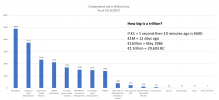time to plan
Registered User
- Messages
- 910
I started a different thread a couple of weeks ago - https://www.askaboutmoney.com/threads/charges-for-executive-pension-zurich.222415/ - around costs for a Zurich executive pension, after I had approached Zurich directly and got contacted by one of their tied agents. There was a good debate on hidden costs and some good advice. After a lot of shopping around, I thought I'd report back on what I found, starting a new thread as it's not really about Zurich pensions any more.
For info: I'm looking for my company (I'm a proprietary director) to contribute 4,000 per month, and I'm 48 years old, with no pension lump sum. Options I found were:
1. Zurich: as per advice on the thread I started, it was possible to get a better deal via a low cost broker. Essentially it removed the early exit charges that the tied agent had in the pricing, which is valuable. I couldn't get the AMC to below the 0.75% the tied agent was charging, although there may be the potential to get it to 0.65% if bringing a big enough lump sum. There were no other monthly charges.
2. Aviva: 0.3% AMC, but they require a financial adviser. I found a good one who would do it for 0.25%. There are 9 Statestreet funds via Aviva that have no additional AMC, and they would have suited me fine in terms of passive trackers.
3. LEAP Self-administered small pension (joint venture between ITC and Conexim): 0.4% (minimum 300 p.a.) + fund costs (Vanguard global index tracker 0.18% as an example) + required financial adviser. I did find a financial adviser who would do this for 0.15% but with a minimum of €300 p.a. and a €1000+VAT set up fee. A different financial adviser would do this for 0.25% with no minimum and a €600+VAT set up fee. The first approach would obviously make more sense with a large lump sum. I found another adviser who insisted I would need fund managers (an additional 1%) which wasn't an approach / cost that works for me.
I settled on the LEAP with the adviser @ 0.25%. The €300 p.a. minimum charge pushes up the AMC % in the first couple of years, but in absolute terms, it's not a huge cost. At a visible cost level, the Aviva option is cheaper, but I am convinced (hopefully not erroneously) of the analysis that there are hidden costs (Marc has posted around this) in funds via pension companies, which materialise in underperformance against an equivalent Vanguard tracker fund. Another option would be to spend a couple of years in the Aviva structure and then move to LEAP, but I can' be bothered with doing this twice, and you would still have the hidden costs to contend with. Or alternatively to spend a couple of years in the Zurich structure, and then removing the early exit charges becomes valuable.
I hope this is useful to someone. Everyone has been really helpful on this forum so I wanted to give something back.
For info: I'm looking for my company (I'm a proprietary director) to contribute 4,000 per month, and I'm 48 years old, with no pension lump sum. Options I found were:
1. Zurich: as per advice on the thread I started, it was possible to get a better deal via a low cost broker. Essentially it removed the early exit charges that the tied agent had in the pricing, which is valuable. I couldn't get the AMC to below the 0.75% the tied agent was charging, although there may be the potential to get it to 0.65% if bringing a big enough lump sum. There were no other monthly charges.
2. Aviva: 0.3% AMC, but they require a financial adviser. I found a good one who would do it for 0.25%. There are 9 Statestreet funds via Aviva that have no additional AMC, and they would have suited me fine in terms of passive trackers.
3. LEAP Self-administered small pension (joint venture between ITC and Conexim): 0.4% (minimum 300 p.a.) + fund costs (Vanguard global index tracker 0.18% as an example) + required financial adviser. I did find a financial adviser who would do this for 0.15% but with a minimum of €300 p.a. and a €1000+VAT set up fee. A different financial adviser would do this for 0.25% with no minimum and a €600+VAT set up fee. The first approach would obviously make more sense with a large lump sum. I found another adviser who insisted I would need fund managers (an additional 1%) which wasn't an approach / cost that works for me.
I settled on the LEAP with the adviser @ 0.25%. The €300 p.a. minimum charge pushes up the AMC % in the first couple of years, but in absolute terms, it's not a huge cost. At a visible cost level, the Aviva option is cheaper, but I am convinced (hopefully not erroneously) of the analysis that there are hidden costs (Marc has posted around this) in funds via pension companies, which materialise in underperformance against an equivalent Vanguard tracker fund. Another option would be to spend a couple of years in the Aviva structure and then move to LEAP, but I can' be bothered with doing this twice, and you would still have the hidden costs to contend with. Or alternatively to spend a couple of years in the Zurich structure, and then removing the early exit charges becomes valuable.
I hope this is useful to someone. Everyone has been really helpful on this forum so I wanted to give something back.




